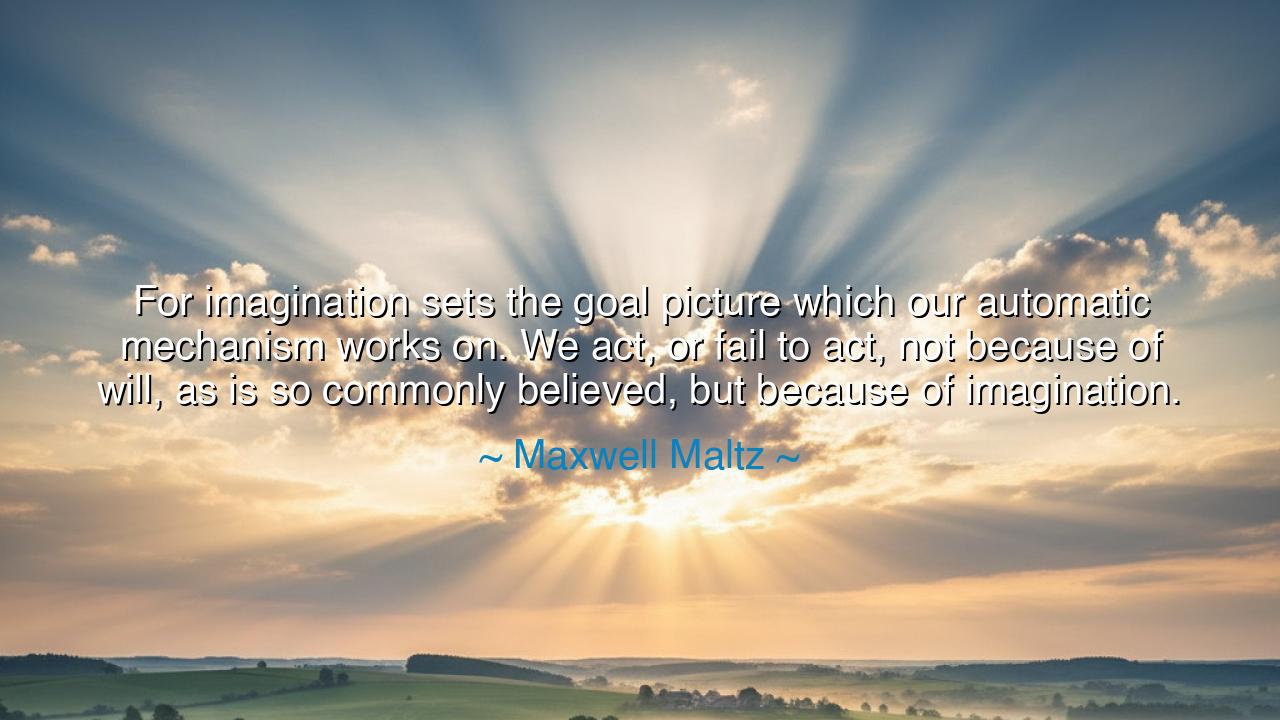
For imagination sets the goal picture which our automatic
For imagination sets the goal picture which our automatic mechanism works on. We act, or fail to act, not because of will, as is so commonly believed, but because of imagination.






“For imagination sets the goal picture which our automatic mechanism works on. We act, or fail to act, not because of will, as is so commonly believed, but because of imagination.” – Maxwell Maltz
In these words, Maxwell Maltz, the physician-turned-philosopher of the mind, revealed a truth as old as human thought and as modern as the science of the self. His wisdom, drawn from the study of both psychology and the living soul, reminds us that it is not willpower alone that moves mountains, but imagination — the hidden architect of destiny. Maltz, who once shaped faces as a plastic surgeon, came to see that far greater transformations came not from the knife, but from the mind. For he noticed that when a man’s body was changed but his self-image remained trapped in old shadows, the man did not change at all. Thus, he sought the true sculptor of human behavior — and found it in the imagination.
To the ancients, imagination was not a fleeting fancy; it was divine sight — the vision that allows mortals to see beyond what is and glimpse what could be. Maltz, speaking with the voice of both scientist and sage, declared that our inner image of ourselves is the goal picture that our subconscious, or what he called the automatic mechanism, strives endlessly to fulfill. We become what we behold within. The imagination is not idle; it is the command center of the soul. If it paints the picture of failure, the body obeys; if it envisions triumph, the spirit follows suit. What man imagines himself to be, he becomes.
This truth can be seen in every age and every story of transformation. Consider Thomas Edison, who, as a boy, was dismissed by his teachers as slow and incapable. Yet in his imagination, he saw the world illuminated — light not by candle or flame, but by harnessed fire from within the atom. His will alone could not have sustained him through a thousand failures. It was his imagination — the vivid, burning picture of a world made brighter — that guided his every action until his vision became reality. Edison’s success was not an act of brute force, but of inner creation; he lived in the reality he imagined long before the world could see it.
Maltz’s insight, then, carries with it both power and warning. For if imagination is the seed of action, then it can bear both fruit and poison. The man who pictures himself as unworthy, unloved, or incapable will act accordingly, sabotaging his own path even when opportunity stands before him. The world becomes a mirror reflecting the shape of his inner image. In this way, imagination is the womb of destiny — but one must be careful what is conceived there. As the saying goes, “As a man thinketh in his heart, so is he.”
In this teaching lies a revelation: willpower is not the master, but the servant. The will cannot create; it can only execute. It acts upon the directions given to it by the images the mind holds most vividly. This is why two men with equal strength and equal chances may meet opposite fates — one succeeds, because he has imagined success; the other fails, because he has imagined defeat. It is not that one tried harder, but that one saw more clearly. The automatic mechanism of the human being is not guided by orders shouted in fear, but by pictures formed in faith.
The ancients knew this well. The Greek philosophers taught that before any great act, the hero must first see himself victorious. The warriors of old would imagine the field of battle conquered before a single sword was drawn. In the East, the monks who trained the body began by training the mind’s eye, for they knew that the body follows thought as the shadow follows light. The painter, the general, the philosopher — all are guided by the same law: first imagine, then act. Without vision, the will is blind.
So, my listener, learn from the wisdom of Maltz and from the testimony of all who have shaped their fate through vision: tend to your imagination. Guard the pictures you hold in your mind, for they are the blueprints of your life. Do not fill them with fear, for fear too will manifest; instead, let them be rich with courage, abundance, and purpose. Each morning, imagine the self you wish to become, not as a dream, but as a reality already unfolding. Then let your actions follow that image as naturally as a river follows its course.
For this is the eternal truth: you do not act because of will, but because of imagination. Will is the soldier; imagination is the commander. If your inner vision is noble, your deeds will follow nobly. And if your picture is bright and steadfast, no darkness in the outer world can long prevail against it. So envision wisely, for the world you see in your mind is the world you will one day walk upon.






AAdministratorAdministrator
Welcome, honored guests. Please leave a comment, we will respond soon